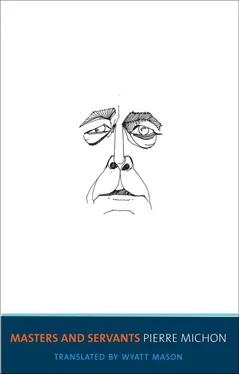Is this too simple, Señora? He had already seen so many Velazquez, our friend Francisco, so on that day he had neither a revelation nor an abyss beneath his feet. And you say that I haven’t talked about the journey he made as a young man to Rome, where he had the leisure to study and absorb everything, Velazquez and his masters, the very best of painting? Of course. You are quite correct. Where did I get this gloomy story about a cave? I was dreaming above this Sevillian cauldron and I suppose I was the one who became drunk from it all when I wanted Goya to be swept up in it, which I guess makes me an old sot. Anyway, you do see him leaving the Pardo at noon, caracoling on his piebald mare? Salut, Peintre de la Chambre . And there he is again in outdoor cafés along the Manzanares, feasting, more fond than ever of the majas since he is now on intimate terms with the Castilians; see how they dance around him, all these colored skirts rising around him, sitting down with him, brushing against tablecloths, handsome Messieurs laughing, poets and matadors with their joyous gestures in the cool shade, perhaps they’re already talking of liberties to come, spoken of in whispers that travel well beyond the Pyrenees. The tricorne is on the table, is matte black; in the full carafes, wine is gleaming. I no longer see Velazquez. Only lilies on water. Tomorrow will be beautiful as well.

IN HIS YOUTH, NOT TO HAVE every woman had seemed an intolerable scandal. But so that you see what I’m getting at— since we can’t get at him anymore: it wasn’t about seduction; he had appealed, as everyone does, to the two, seven, thirty, or hundred women bestowed upon each of us in accordance with our heights and our faces, our spirits. No, what infuriated him in the streets, in the wings and in the workshops, at the tables of all those who welcomed him, at the homes of princes and in gardens, essentially anywhere women ventured, was that he couldn’t arbitrarily decide to have a particular one, a patron’s wife, a gamine, or an old trollop, couldn’t just point her out with his index finger and have her come and offer herself to him, to be thrown down right there or carried off elsewhere, and be taken. But again, so that you see what I’m getting at: it wasn’t about keeping them there, by a law or some other violence; no, what he wanted was for them to want him as he wanted them, indifferently and absolutely, so that this desire made them as wordless as it made him, so that of their own accord they ran deep into a wood, mute, aroused, out of breath, and prepared themselves to be consumed, without any intervening process. That’s what he told me, that evening in July, between two coughing fits, and more crudely than I have said: he wanted license; he felt the multiple gift he awaited was somehow due him, but he didn’t tell me what debt it was meant to repay, for which he would never be reimbursed, and the enormity of which, the presumptuousness, made him laugh at himself; he didn’t bother asking for it; he just wanted to keep quiet, he wanted offerings to this silence; and he wanted for his to have been the only hand in all those dresses, with no more comment than— as sparkling as a spoken language — silk skirts at the frenzied instant. He didn’t get a penny — evidently, he wanted too much or too little. Perhaps in that regard he was like all men; my condition hardly permits me to judge and, anyway, I live in seclusion.
I AM THE CURATE OF NOGENT. When I knew him, he had long since given up waiting for his license, and therefore, he painted. Fat Crozat had sent for him, or perhaps it was Haranger, the abbot; those of the beau monde have their peculiar enthusiams here, their Chinese pavilions, their colonnaded groves in which to take meals, listen to violins, to leaves, while watching the Marne through gaps in the trees. So I can’t really say which of these great protectors was keeping him, had put him up for the winter in a summery little pagan temple, all terraces and windows, filled with openwork, breezy as a dance hall, which he had given up all hope of heating despite the great fires that burned all day. He went to Mass, perhaps out of habit (I am no longer so certain); I never noticed him there; one morning, after the seven o’clock service, as I was leaving the church, he came up to me. This was before the death of le Grand Roi . It was barely light out. A cold wind blew.
He introduced himself, I knew his name; I didn’t know his works: I repeat, I live in seclusion. In the dawn light, his gawkiness surprised me. Back then, we hadn’t yet taken to wearing powdered perukes; we wore big wigs, enormous morning coats, ribboned culottes, endless skirts and cuffs. The scrawny man who stood before me seemed lost within these rags. Perhaps I hadn’t slept very well, but I thought that he didn’t look real; you doubted that there was a body within the bundle; but beneath his considerable mass of fake hair, it was difficult to doubt the veracity of a face that wavered between a strong desire to seduce and an even more dizzying need to displease; this made him appear perpetually stunned, feverish, and dumbfounded; it seemed to me that a ghost caught out at dawn would be similarly perplexed, would be similarly eager to make its way back to its dismal home. The wind lifted his wig a little — he had black hair, he was young. His nose was too big. There, on the steps, his hands crossed behind his back, looking down at me from above, this puppet spoke in a friendly voice, a voice with an edge hinted at in his face.
He apologized for the frivolity of his request; he was in great need of a face for one of his big canvases, a face like mine; and when I exclaimed how unremarkable it was, how ordinary, how it was as likely found on a curate’s habit as on a musketeer’s collar or on a porter’s shoulders, he impressed upon me that this quality was not so common in a world in which musketeers and porters believe themselves to be out of the ordinary, and take great pains to make such supposed distinction clear. He insisted, charmingly, flattering me with explanations of how deplorably dull I was; he tempted me nearer while keeping me at arm’s length; I couldn’t tell if he was poking fun at me, at my face; whether it frustrated him or pleased him. He was smiling, but he still seemed baffled by something; it wasn’t me, at least I don’t think it was, I was so predictable, so taken aback by his aplomb but at last giving in to it, at last accepting to be his model. Abruptly, he said good-bye and moved off with long strides through the dry wind. I forgot to say that he was tall.
My face was painted over two mornings, in the icy little temple I have already mentioned. The painting was all but finished before I had even arrived: it was of a tall Pierrot with his arms at his sides, standing there stupidly. What can I say? I haven’t any ambitions now, but on my way there I had hoped, for once, to find myself in the pose of prelate, or perhaps as a prophet, and I would have happily settled for a minor part in some big sacred painting, a Levite trailing Joad or an obscure witness to the Passion, rather than for the powdered lead he wanted me to play. I remained dumb before this big white thing; he pretended to suddenly notice my embarrassment, which, apparently, he had expected; he apologized grandly — laughing — and I did my best to laugh as well: my face was supposed to be anyone’s, and anyway, who would recognize it in the homes of the gentlemen where our painting would be hung. I posed.
I saw a leafless landscape through the windows; I saw leafy landscapes on the walls, painted, autumns and summers in arbors, on banks, sudden sunlight and secluded shadows, as though sealed tightly beneath clusters of trees one wouldn’t dare enter; before them were beautiful women with their backs to us, perfectly postured, with long naked necks, dresses rising and falling back to their feet, dresses as closed as the shadows of the woods. Something like the world. I was surprised that someone would devote a life to such things, to faking things and not quite succeeding at it, and when one succeeds one only adds one ephemera to another, what one can’t have to what one doesn’t; and yet, to this game of coin and counterfeit, some give themselves over completely.
Читать дальше













